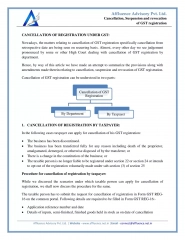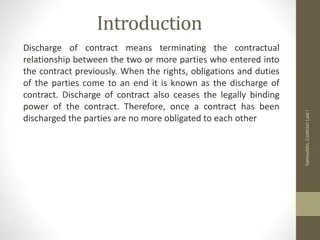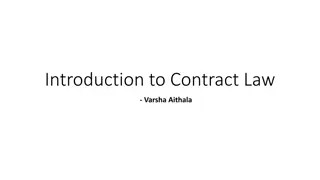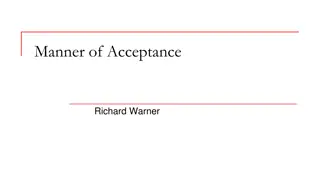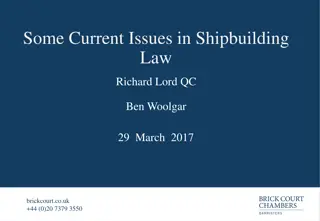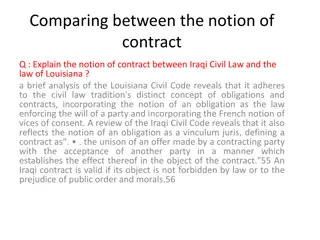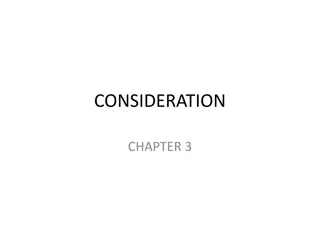Understanding Revocation of Continuing Guarantee in Contract Law
Section 130 of the Contract Act allows a continuing guarantee to be revoked by the surety at any time, affecting future transactions. Similarly, Section 131 provides for revocation due to the surety's death, and Section 133 discharges the surety if contract terms are varied without consent. Examples illustrate how revocation impacts the liability of parties involved in guarantees.
Download Presentation

Please find below an Image/Link to download the presentation.
The content on the website is provided AS IS for your information and personal use only. It may not be sold, licensed, or shared on other websites without obtaining consent from the author. Download presentation by click this link. If you encounter any issues during the download, it is possible that the publisher has removed the file from their server.
E N D
Presentation Transcript
CONTRACT OF GUARANTEE BY SHIKHA JOSHI Assistant Professor Durga Mahavidhyalay, RAIPUR
REVOCATION OF CONTINUING GUARANTEE 1. By notice of revocation - Section 130 of the Act provides that a continuing guarantee may at any time be revoked by the surety, as to future transactions, by notice to the creditor.
Examples A , discounting, at A s request, bills of exchange for C , guarantees to B , for 12 months, the due payment of all such bills to the extent of Rs. 5,000. B discounts bills for C to the extent of Rs. 2,000. Afterwards, at the end of 3 months, A revokes the guarantee. This discharges A from all liability to B for any subsequent discount. But A is liable to B for Rs. 2,000, on default of C . in consideration of B s revocation
A guarantees to B, to the extent of Rs. 10,000, that C shall pay all the bills that B shall draw upon him. B draws upon C . C accepts the bill. A gives notice of revocation. C dishonours the bill at maturity. A is liable upon his guarantee.
2. By suretys death Section 131 of the Act provides for revocation of continuing guarantee by surety s death. I t states that the death of the surety operates, in the absence of any contract to the contrary, as a revocation of a continuing guarantee, so far as regards future transactions.
3. By variation in terms of contract Section 133 of the Act provides for discharge of surety by variance in terms of contract. It states that any variance, made without the surety s consent, in the terms of the contract between the principal debtor and the creditor, discharges the surety as to transactions subsequent to the variance.
EXAMPLE A becomes surety to C for B s conduct as a manager in C s bank. Afterwards, B and C contract, without A s consent, that B s salary shall be raised, and that he shall become liable for 1/4th of the losses on overdrafts. B allows a customer to overdraw, and the bank loses a sum of money. A is discharged from his suretyship by the variance made without his consent, and is not liable to make good this loss.
4. By release or discharge of principal debtor Section 134 of the Act provides for discharge of surety by release or discharge of principal debtor. It states that the surety is discharged by any contract between the creditor and the principal debtor, by which the principal debtor is released, or by any act or omission of the creditor, the legal consequence of which is the discharge of the principal debtor.
EXAMPLE A gives a guarantee to C for goods to be supplied by C to B . C supplies goods to B , and afterwards B embarrassed and contracts with his creditors (including C ) to assign to them his property in consideration of their releasing him from their demands. Here B is released from his debt by the contract with C , and A is discharged from his suretyship. becomes
5. By composition, extension of time and agreement not to sue Section 135 of the Act provides for the discharge of surety when creditor compounds with, gives time to, or agrees not to sue, principal debtor. It states that a contract between the creditor and the principal debtor, by which the creditor makes a composition with, or promises to give time to, or not to sue, the principal debtor, discharges the surety, unless the surety assents to such contract.
6. By creditors act or omissions impairing surety s eventual remedy Section 139 of the Act provides for discharge of surety by creditor s act or omission impairing surety s eventual remedy. It states that if the creditor does any act which is inconsistent with the rights of the surety, or omits to do any act which his duty to the surety requires him to do, and the eventual remedy of the surety himself against the principal debtor is thereby impaired, the surety is discharged.
EXAMPLE B contracts to build a ship for C for a given sum, to be paid by instalments as the work reaches certain stages. A becomes surety to C for B s due performance of the contract. C , without the knowledge of A , prepays to B the last two instalments. A is discharged by this prepayment.
7. Loss of security under contract Section 141 of the Act provides for Surety s right to benefit of creditor s securities. It states that a surety is entitled to the benefit of every security which the creditor has against the principal debtor at the time when the contract of suretyship is entered into, whether the surety knows of the existence of such security or not; and if the creditor loses, or, without the consent of the surety, parts with such security, the surety is discharged to the extent of the value of the security.
EXAMPLE C , advances to B , his tenant, Rs. 2,000 on the guarantee of A . C has also a further security for the Rs. 2,000 by a mortgage of B s furniture. C cancels mortgage. B insolvent and C sues A on his guarantee. A is discharged from liability to the amount of the value of the furniture. the becomes
8. By misrepresentation Section 142 of the Act provides for guarantee obtained by misrepresentation invalid. It states that any guarantee which has been obtained by means of misrepresentation made by the creditor, or with his knowledge and assent, concerning a material part of the transaction, is invalid.
9. By concealment Section 143 of the Act provides for Guarantee obtained by concealment invalid. It states that any guarantee which the creditor has obtained by means of keeping silence as to material circumstances, is invalid.
EXAMPLE A engages B as clerk to collect money for him. B fails to account for some of his receipts, and A in consequence calls upon him to furnish security for his duly accounting. C gives his guarantee for B s duly accounting. A does not acquaint C with B s previous conduct. B afterwards makes default. The guarantee is invalid.


